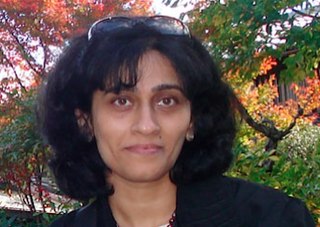The Shanti Swarup Bhatnagar Prize for Science and Technology (SSB) is a science award in India given annually by the Council of Scientific and Industrial Research (CSIR) for notable and outstanding research, applied or fundamental, in biology, chemistry, environmental science, engineering, mathematics, medicine, and physics. The prize recognizes outstanding Indian work in science and technology. It is the most coveted award in multidisciplinary science in India. The award is named after the founder Director of the Council of Scientific & Industrial Research, Shanti Swarup Bhatnagar. It was first awarded in 1958.

Sree Chitra Tirunal Institute for Medical Sciences and Technology (SCTIMST), formerly Sree Chitra Tirunal Medical Center, is an autonomous medical school and an Institute of National Importance in India established in 1976 at Thiruvananthapuram, Kerala. The institute is named after Chithira Tirunal Balarama Varma, the last Maharajah of Travancore, who gifted the building. The institute is under the Administrative Control of the Department of Science and Technology, Government of India. SCTIMST is one of the most prominent research Institutes and centers in India.
Chetan Eknath Chitnis is an Indian scientist in the field of malaria research. He is the head of the Malaria Parasite Biology and Vaccines Unit at the Institut Pasteur in Paris and an elected fellow of the Indian Academy of Sciences (2009) as well as Indian National Science Academy (2014). He received the Shanti Swaroop Bhatnagar Award in 2004 and the Infosys Prize in Life Sciences 2010. Chitnis is the former principal investigator of the malaria research group at the International Centre for Genetic Engineering and Biotechnology (ICGEB) in New Delhi.

Maharaj Kishan Bhan was an Indian pediatrician and clinical scientist. He received M.B.B.S. Degree (1969) from Armed Forces Medical College, Pune and M.D. Degree from Post Graduate Institute of Medical Education and Research, Chandigarh. He carried out extensive post doctoral research at All India Institute of Medical Sciences in the areas of diarrheal diseases and child nutrition with an emphasis on public health issues. He served as the president of the Jawaharlal Nehru Institute of Postgraduate Medical Education & Research (JIPMER).
Yamuna Krishnan is a professor at the Department of Chemistry, University of Chicago, where she has worked since August 2014. She was born to P.T. Krishnan and Mini in Parappanangadi, in the Malappuram district of Kerala, India. She was earlier a Reader in National Centre for Biological Sciences, Tata Institute of Fundamental Research, Bangalore, India. Krishnan won the Shanti Swarup Bhatnagar Prize for science and technology, the highest science award in India in the year 2013 in the Chemical Science category.

Vidita Vaidya is an Indian neuroscientist and professor at the Tata Institute of Fundamental Research, Mumbai. Her primary areas of research are neuroscience and molecular psychiatry.
Bhabatarak Bhattacharyya, popularly known as Bablu Bhattacharyya, is an Indian structural biologist, biochemist and academic, known for his studies on the colchicine-tubulin interaction. He is a former professor and the head of the department of biochemistry at the Bose Institute, Kolkata and an elected fellow of the Indian Academy of Sciences, Indian National Science Academy, National Academy of Sciences, India and The World Academy of Sciences. The Council of Scientific and Industrial Research, the apex agency of the Government of India for scientific research, awarded him the Shanti Swarup Bhatnagar Prize for Science and Technology, one of the highest Indian science awards, in 1988, for his contributions to biological sciences.
Suman Kumar Dhar is an Indian molecular biologist and a professor at the Special Centre for Molecular Medicine of Jawaharlal Nehru University. He is known for his studies on the DNA replication and cell cycle regulation in Helicobacter pylori and Plasmodium falciparum, two pathogens affecting humans. An elected fellow of the National Academy of Sciences, India, Indian National Science Academy and the Indian Academy of Sciences, he is also a recipient of the National Bioscience Award for Career Development of the Department of Biotechnology in 2010. The Council of Scientific and Industrial Research, the apex agency of the Government of India for scientific research, awarded him the Shanti Swarup Bhatnagar Prize for Science and Technology, one of the highest Indian science awards, in 2012, for his contributions to biological sciences.

Shahid Jameel is an Indian virologist and academic. Dr. Jameel is the Sultan Qaboos bin Said Fellow at Oxford Centre for Islamic Studies and Research Fellow, Green Templeton College, University of Oxford. He serves as the Principal Investigator for the Centre's project on Public Health, Science and Technology in Muslim societies. Previously he was the director of the Trivedi School of Biosciences since its inception in the year 2020 at Ashoka University. He was formerly head of the scientific advisory group to the Indian SARS-CoV-2 Genomics Consortia (INSACOG) established in December 2020, and the chief executive officer of Wellcome Trust DBT India Alliance. Known for his research in hepatitis E virus, Jameel is an elected fellow of all the three major Indian science academies viz. National Academy of Sciences, India, Indian Academy of Sciences, and Indian National Science Academy. The Council of Scientific and Industrial Research, the apex agency of the Government of India for scientific research, awarded him the Shanti Swarup Bhatnagar Prize for Science and Technology, one of the highest Indian science awards for his contributions to Medical Sciences in 2000.
Javed Naim Agrewala is an Indian immunologist, the prof. at Indian Institute of Technology Ropar and the chief scientist and professor at the Institute of Microbial Technology, Chandigarh. Known for his research on Tuberculosis, Agrewala is an elected fellow of all the three major Indian science academies viz. National Academy of Sciences, India, Indian National Science Academy and Indian Academy of Sciences. The Council of Scientific and Industrial Research, the apex agency of the Government of India for scientific research, awarded him the Shanti Swarup Bhatnagar Prize for Science and Technology, one of the highest Indian science awards for his contributions to Medical Sciences in 2005. He is also a recipient of the National Bioscience Award for Career Development of the Department of Biotechnology.
Anurag Agrawal is an Indian pulmonologist, medical researcher, Dean of the Trivedi School of Biosciences at Ashoka University, and the former director of the Institute of Genomics and Integrative Biology, a CSIR institution. Known for his studies on lung diseases, Agrawal has been a senior fellow of the DBT-Wellcome Trust. The Council of Scientific and Industrial Research, the apex agency of the Government of India for scientific research, awarded him the Shanti Swarup Bhatnagar Prize for Science and Technology, one of the highest Indian science awards for his contributions to Medical Sciences in 2014. He is also a recipient of the National Bioscience Award for Career Development of the Department of Biotechnology which he received in 2015 and the 2020 Sun Pharma Science Foundation award in Medical Sciences.
Thomas John Pucadyil is an Indian molecular biologist, biochemist and a professor and chair of biology at the Indian Institute of Science Education and Research, Pune. Known for his studies on membrane biochemistry and vesicular transport, Pucadyil is an international research scholar of the Howard Hughes Medical Institute/Bill & Melinda Gates Foundation and a senior fellow of the Wellcome Trust- Department of Biotechnology. The Council of Scientific and Industrial Research, the apex agency of the Government of India for scientific research, awarded him the Shanti Swarup Bhatnagar Prize for Science and Technology, one of the highest Indian science awards, for his contributions to biological sciences in 2018.
Amit Singh is an Indian microbiologist and an associate professor at the department of microbiology and cell biology of the Indian Institute of Science. A Wellcome-DBT Senior Fellow, Singh is known for his studies on the pathogenesis of Mycobacterium tuberculosis. The Department of Biotechnology of the Government of India awarded him the National Bioscience Award for Career Development for 2017/18. He was awarded with the prestigious CSIR- Shanti Swarup Bhatnagar award on 2021 for his phenomenal contributions in bio-scientific research. He received the 2021 Shanti Swarup Bhatnagar Prize for Science and Technology in Biological Science.
V. Ramankutty is an Indian health economist, and epidemiologist, currently research director of Amala Cancer Research Centre, Amala Institute of Medical Sciences, Thrissur and an emeritus professor at the Sree Chitra Tirunal Institute for Medical Sciences and Technology. He is the son of former Chief Minister of Kerala, C. Achutha Menon.

Surajit Dhara is an Indian physicist affiliated to the School of Physics in University of Hyderabad, Telangana, in various capacities since 2006. His area of special interest is soft matter physics. He studies control and manipulation of topological defects of liquid crystals, elasticity and defect mediated directed assembly, topological active matter, rheology and photonics of liquid crystals. He is a recipient of the Shanti Swarup Bhatnagar Prize for Science and Technology for his contributions to physical sciences in 2020.
Kanak Saha is an Indian astrophysicist. He is an associate professor of astrophysics at Inter-University Centre for Astronomy and Astrophysics. His research interests include formation of galaxies in the early universe and their evolution. The Council of Scientific and Industrial Research, the apex agency of the Government of India for scientific research, awarded him the Shanti Swarup Bhatnagar Prize for Science and Technology for his contributions to physical sciences in 2021.
Saket Saurabh is an Indian Computer Scientist who is currently the Professor of Theoretical Computer Science at the Institute of Mathematical Sciences, Chennai (IMSc), India and an adjunct faculty at University of Bergen, Norway. He specializes in parameterized complexity, exact algorithms, graph algorithms and game theory. His fundamental contributions to the area of parameterized complexity include procedures for obtaining algorithmic lower bounds, and meta-theorems on preprocessing. Saket Saurabh was awarded the Shanti Swarup Bhatnagar Prize for Science and Technology in Mathematical Sciences in the year 2021.
Bushra Ateeq is a Professor and a Senior Fellow of the DBT/Wellcome Trust India Alliance in the Department of Biological Sciences and Bioengineering (BSBE), IIT Kanpur specializing in cancer biology and molecular oncology. She was awarded the Shanti Swarup Bhatnagar Prize for Science and Technology in Medical Sciences in the year 2020. Her research interest involves exploration of the genetic and epigenetic changes that initiate cancer and its progression. She is also focusing on understanding the molecular events that drive cancer and resistance towards chemotherapeutic drugs.
Ritesh Agarwal is a professor in the Department of Pulmonary Medicine at the Postgraduate Institute of Medical Education and Research, (PGIMER) Chandigarh, having research interests in allergic bronchopulmonary aspergillosis (ABPA). He was awarded the Shanti Swarup Bhatnagar Prize for Science and Technology in Medical Sciences in the year 2020 for his contributions in the field of ABPA.




